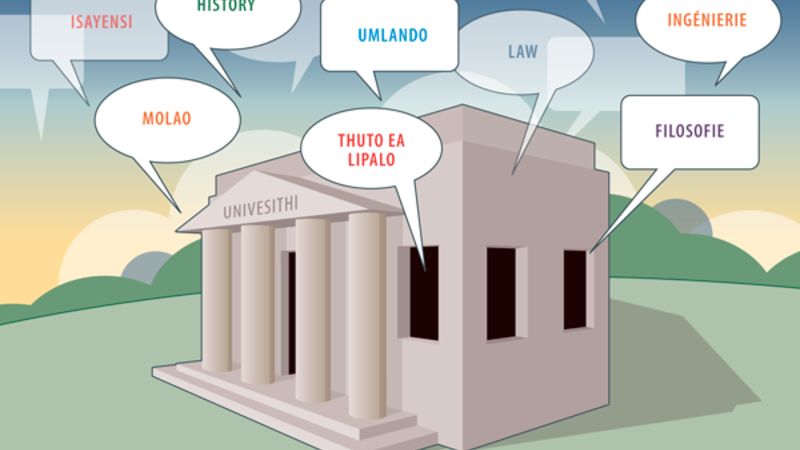
Part A: Journalism Feature.
540 Words
Multilingualism, as a tool in communication and inclusivity, permeates different work environments
at Rhodes University. Given the vast number of languages spoken amongst students, the need for
multilingualism becomes increasingly more important where Rhodes University’s Language
Committee aims to actualise this need. Their continuous drafting of new policies sheds light on their
commitment to multilingualism. While their commitment is important, the impact it has had on the
culture amongst staff and students at the University should also be noted.
“The entire university is consulted,” Naidu, chairperson of Rhodes University’s Language Committee
says when referring to the drafting of new policies. The Language Committee aims to “ensure that
language is not a barrier to equity of access, opportunity and success”. In reference to this aim, several
teachers at Rhodes University have attempted to integrate multilingual practices in their teaching.
Recently, in collaboration with the Centre for Higher Education Research Teaching and Learning
(CHERTL), the Language Committee organised a campaign to raise awareness about implementing
these teaching strategies. Athena Adams, who works at CHERTL, speaks about the benefits of these
linguistic strategies; “students can feel more included” as the strategies have been implemented “for
the student[s] wellbeing and [for] pedagogical reasons.”
Politics students, Zenande Sidziya and Hlumelo Jubase speak of their experiences in Dr Magadla’s
class. “When you hear it [the content] in your mother tongue, it resonates with you”, mother tongue
Xhosa speaker, Sidziya says when reflecting on Magada’s integration of Xhosa in her lectures.
Sidziya also refers to how her education has been enriched through Magadla’s teaching style. Jubase
shares Sidziya sentiments and considers how, through teaching in isiXhosa, Magadla has been able to
communicate her point quickly by referring to the practices and phrases in her linguistic context.
Journalism tutor, Brendon Reyneke, although predominantly English speaking, recognises the
importance of multilingualism and the support necessary for multilingual students. Reyneke points to
a current obstacle in the creation of a culture where isiXhosa is “a language of learning and teaching”
— one of the Language Committee’s aims. Last semester, a student wrote their journalism
assignments in IsiXhosa as they found that writing in their home language would help them articulate
their narrative better. However, “it took three and a half weeks to get it back to her,” Reyneke says.
Instead, “we need students to not be afraid to write in isiXhosa” Reyneke continues as he considers
the impact students’ demands can have in changing linguistic structures at Rhodes University.
While a multilingual culture infiltrates teaching spaces, non-academic staff are impacted by this
culture too. Thozama Kiswa, one of Miriam Makeba’s dining hall staff member says, “I like to talk
[in] English because I don’t know English”, identifying a learning opportunity in the university’s
multicultural environment. Similarly, Mama Zoleka, Walker House’s housekeeper, points to the
collaborative nature of a multilingual climate. “I like to speak English to them but at the same time, I
like to speak Xhosa,” Zoleka says when recalling the reciprocal relationship, she has with some of
girls in the residence.
As a multilingual society, Rhodes University’s progression in celebrating multilingualism slips into
both academic and non-academic spaces. While the grounds to better multilingualism in certain
settings is still necessary, students have benefitted by the university’s growing multilingual culture.
References:
Sam Naidu. English Lecturer and Chairperson of the Language Committee. s.naidu@ru.ac.za.
Athena Adams. Works at Centre for Higher Education Research Teaching and Learning (CHERTL).
Zenande Sidziya. First year student studying Politics. 084 466 4722.
Hlumelo Jubase. First year student studying Politics. 078 522 9765.
Brendon Reyneke. Journalism tutor for second years. reyneke.brendon@gmail.com.
Thozama Kiswa. Works in Miriam Makeba’s dining hall.
Mama Zoleka. Works at Walker House, Rhodes University.
